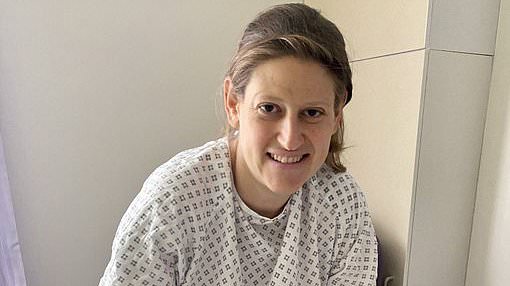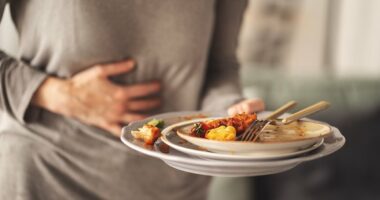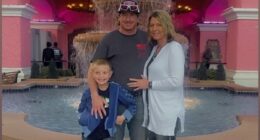Share this @internewscast.com
With unflinching honesty, Theo Clarke yesterday laid bare the brutal realities of childbirth in today’s NHS – and her own 48-hour labour which left her fearing for her life. In today’s extract from her powerful birth memoir, the ex-Tory MP who led Parliament’s first debate on birth trauma reveals how she turned her own experience into a rallying cry for change…
My baby daughter was handed to me and I felt an instant rush of love. I truly forgot everything – despite the horrors of the previous few hours – as my husband Henry and I hugged as a family of three, agreeing to call her Arabella.
We were so wrapped up in the joy of meeting our daughter I didn’t notice that I was still bleeding. Henry called for help and suddenly the room was full of people. My baby was taken away; I felt her loss as if my arm had been cut off. My legs were covered in blood.
I was rushed into theatre: the trolley bumped into the walls and I was slid on to the operating table, where I lay bleeding out. I shook from terror as I was stitched. The only thing that stopped me from blacking out was the desire to see Arabella again.
Nurses took away huge cotton pads soaked with blood and the surgeon’s needle and thread went back and forth, up and down, as they sewed me back together inside, and out.
I only half heard when a more senior surgeon was asked to step in to try to fix the extensive damage between my anus and vagina. By the time I was transferred to the recovery ward my daughter was nearly three hours old and I had not seen her; no cot was brought in and no one took the time to update me on what had happened to her.
I was kept in recovery with concerns over a spike in my temperature. I lay on the trolley, a dead weight, with my arm hanging out as the nurse took six test tubes of blood.
It was more than six hours after Arabella’s birth when I was taken back to the ward. I rang the emergency bell and, very agitated, repeatedly asked to see Arabella. Had something happened to her and they hadn’t told me?

My baby daughter was handed to me and I felt an instant rush of love. I truly forgot everything – despite the horrors of the previous few hours, writes THEO CLARKE
It was midnight, the staff had changed, and I didn’t recognise anyone. I was aware of the strangest sensation of feeling both shredded and stitched up inside.
I had suffered a third-degree tear, a horrifying and debilitating injury that involves the partial tearing of the anal sphincter – and I now know that thousands of women suffer this every year.
I had no idea of the shame and silence that surrounds post-natal injuries, nor how many women have the same dismal experience of the NHS as I did.
I was the Conservative MP for nearby Stafford, elected in the Boris landslide of 2019. The raw experience of giving birth was to change my political life.
Some might recall the first time I spoke in Parliament about birth trauma, when I broke down in tears as I described my own experience. Hundreds of women got in touch with me, telling the same, distressing stories of inadequate care.
Since then, I hope I have helped to change things: with Labour MP Rosie Duffield I founded the All-Party Parliamentary Group on Birth Trauma, then led Britain’s first national inquiry into birth trauma, which reported last year.
Going by the experiences of the many, many women I have talked to, the maternity unit where I gave birth was typical – no better, no worse than hundreds of others around the country.
That night, as I lay exhausted and depleted after giving birth, I was ignored. I asked for more medication, but the midwife said she was busy, adding in a dismissive tone that she had 28 other patients to look after.
No one offered Henry or me any food. I fell asleep eventually, with my exhausted husband lying next to me on the floor.
I woke up and suddenly my daughter was there, lying in a transparent cot. My hand was still hooked up to the IV with tubes and I had a urinary catheter in. My legs felt heavy and frozen from the epidural and I couldn’t move my feet.

The moment Theo wept in the Commons as she described the ‘terrifying’ moment she thought she was going to die in childbirth
I was devastated that I could not pick up my baby and hold her. I watched her sleeping instead. She was in a white and pink onesie and I could see there was a minuscule drip in her small hand, attached to a splint so she could not pull it out. She was so small and calm and I loved her completely.
I wanted desperately to walk over and pick her up, but I couldn’t move, so I asked Henry to do it. I lay immobile on the bed as he brought her to me to hold, then wept as the three of us were finally together again as a family.
At 1.30am I was finally brought a hot meal, which was mushy and tasteless. Instead, I ate little bites of plain brown bread like a sparrow and sipped water from a cup, which I found difficult to hold while hooked to the IV. My catheter had been removed, but my body no longer seemed to be under my control.
When Henry returned, he carried me to the bathroom to use the bedpan, where I passed urine and blood. He lifted me to the bath and hosed me down with the shower. I was desperate to feel clean, but I constantly bled all over the floor and excrement ran down my legs. Henry gently held me upright on the toilet. I felt weak and ashamed.
At 8am, the day shift began and a nurse came to top up my antibiotics. I was so overwhelmed by pain it was difficult to think about
Arabella’s needs, too. I was unable to sit up on my bottom.
This was not how I had imagined my first few days with my daughter to be. I felt like a total failure.
Henry had been awake since the start of my induction, three days earlier. When he went home to sleep, Arabella began to scream. I pressed the bell for help, but no one came. After a long time calling out repeatedly, a nurse entered the room. She took one look at me lying pitifully on the bed and told me, ‘Not my baby, not my problem.’

When she went public, a huge number of women wrote to Theo sharing their stories
Then she walked out, leaving me there. I had never felt so vulnerable and alone. Finally, I was moved to the midwife-led unit where I had originally planned a water birth. That now seemed a lifetime ago.
There were more people around, but the ward seemed understaffed. A senior midwife tried to help me breastfeed, but Arabella could not latch.
I tried every 15 minutes, but I started to flag and feel disheartened. The midwife resorted to manually pumping my breasts to start colostrum production, but Arabella was starving. Henry had to drive to the nearest supermarket in Stoke-on-Trent to buy pre-made bottles with sterilised milk in to feed our daughter.
The next morning, a doctor told me I would have a follow-up appointment with the specialist clinic for my obstetric anal sphincter injury – the third-degree tear. I did not understand what this meant. I was so tired that I could barely listen.
Over six days in hospital, I learned to press the emergency buzzer at least 30 minutes before the painkillers wore off, knowing it might take a long time for anyone to come. I longed for my own bed with soft pillows and privacy when I went to the toilet.
Just as I was being discharged, a message was left on my voicemail from a local resident complaining about not being able to have a face-to-face surgery appointment with me, suggesting that as I’d had my baby nearly ‘a whole week ago’, I should be available to them as their local MP.
It was agonising to walk. Once I’d crawled into bed, I wanted to stay there for weeks and rest, but I had to try to breastfeed. My nipples were bleeding and I still could not sit. I only left our bedroom to painfully inch my way to the bathroom. I couldn’t risk the stairs yet, so Henry had to bring me food every day in bed.
I didn’t read or watch TV, but I never once felt bored. I just lay there trying to rest when I could.
I constantly needed the toilet and it was impossible to hold anything in. I often didn’t make it in time and excrement and urine ran all over the floor. I bled everywhere, with a constant, heavy period that seemed to never end and which caused me deep embarrassment.
I began to think I might never be able to leave the house again.
I was on an array of painkillers and Henry had to inject me with a large needle to prevent blood clots, which left bruises up my legs.
It was a struggle to get through each day, but Arabella was beautiful and I was so relieved to feel a strong bond with her, despite us being separated so early on.
Her fluffy dusting of sandy hair had the unique smell of a newborn baby and when she snuggled up to me on the bed, I could feel her warm body against mine.
I still could not feed properly and when Arabella screamed with hunger, I would have to resort to giving her formula. The antenatal classes I had attended led me to believe I would be able to naturally feed my daughter with ease, so breast pumping made me feel like a failure as mother.
I wore a ‘hands-free pumping bustier’, which was a black stretchy bra with two holes in it. Plastic bottles were attached and I was then hooked up to the bright yellow machine, which was a double pump that attached to my breasts with suction cups for around 20 minutes at a time. I felt like a cow being milked.
I couldn’t bear for anyone to see me like this. No one had met Arabella bar us and my mother, and I put off my in-laws coming to visit for as long as I could.

In the House of Commons Theo described her difficult labour, post-partum haemorrhage and being rushed into surgery
I sent a short text with a photograph of her to close family. I felt numb and I wasn’t ready to acknowledge the shocking truth of what had happened to me.
The only medical appointment I was invited to in those first few weeks was for Arabella, not me.
At her six-week check-up with my local GP, the only reference to myself as the mother was the final question, asking if I suffered from postnatal depression.
One night I woke covered in sweat and shaking as if I had jungle fever. I was so disorientated that I thought I was suffering from a bout of malaria. My sheets were soaked through and my drenched nightie clung to my clammy skin. Postpartum night sweats were a discomfort I was not expecting.
No one had told me that they happened after having a baby, due to changing hormone levels as my body attempted to regulate itself. Low oestrogen levels made my body believe it was too hot, so it cooled itself by excessive sweating. The sweats lasted for more than a week and left me even more tired and irritable each morning.
I was still constantly needing the loo and finding it impossible to control my bowels. One morning, Henry found me passed out on the toilet, pants around my ankles, with Arabella asleep in her cot and a stinking mess on the floor.
When I consulted my GP because my stitches had become red and inflamed, she told me that was not her job and that I needed to drive half an hour to A&E at Royal Stoke and queue to be seen again.
She didn’t have access to my medical notes as it was a different computer system from the hospital’s. I wondered how this was even possible when both the surgery and hospital were only 13 miles apart in Staffordshire.
It was only when I attended the perineal clinic at Royal Stoke that I finally felt like anyone was checking up on my physical health. The specialist, Nicole, was the first person to make me feel she cared.
She confirmed that my symptoms were normal after a serious birth injury and talked me through how to help my body to recover. She was also the first person to mention sex, though that was the last thing on my mind – I didn’t know how I would have penetrative sex ever again.
It was a relief that the Speaker had arranged for me to vote via proxy for six months. I had designated my constituency office manager, James, to be my official representative for the duration but, while I could vote remotely, he was refused admittance to MP-only briefing calls on policy and ministers would not speak to him about casework.
This meant that despite having to recover from major surgery and the stress of looking after a newborn baby, I was never truly off duty. I felt lazy every time I lay on the sofa to close my eyes when my baby was asleep. It was a new challenge for me not to constantly work. Westminster had become an addictive bubble where the daily thrill of breaking news and world events had made life manic.
On September 5, 2022, when Arabella was nearly three weeks old, Liz Truss was elected leader of our party. Three days later, the Queen died and a period of national mourning began.
Residents and councillors complained when I failed to attend a local service of thanksgiving for the new King. It added to my stress and agitation that I was being criticised for not doing my job. I knew what a huge moment it was in our history and I felt shame that I was seen as absent from my duties.
My first Monday morning back in Parliament felt strange. It was by now late February and the last time I had been at work full-time, Boris Johnson had been the Prime Minister. It was now Rishi Sunak. It felt like nothing and everything had changed.
I was still trying to recover. At my first Prime Minister’s Questions – where I was determined to ask about a proposal to relocate 500 single male asylum seekers to Stafford – I was terrified that I would be unable to control my bowels properly. What would happen if I had to run out to the toilet in the middle of speaking live in front of the cameras?
Four days after returning from maternity leave my constituency association tried to deselect me. I was astonished. The Conservatives were supposed to be the party of the family, but an actual newborn baby seemed to be an unwelcome distraction. I fought back and won on a second vote, but I was disillusioned.
It was often difficult to point to any visible proof that I was making a difference to my constituency. One of the few times was setting up the Stafford Network for Mental Health.
On a visit to its new crisis assessment centre, I was invited into its parent and baby unit. It was the first time I had heard the term ‘postpartum psychosis’ and I was dismayed to hear from mothers about symptoms including hallucinations, delusions, manic behaviour and confusion. I was also shocked to hear that suicide was the leading cause of direct maternal deaths between six weeks and 12 months after birth.
That night, I did some research and discovered that there were only 19 mother and baby units in England. I had no background or expertise in health care at all, so I didn’t feel confident I’d be able to make any difference on improving maternity provision, but I felt compelled to try. I had a responsibility to at least ask the right questions.
I contacted the Birth Trauma Association. Its CEO, Kim Thomas, told me 30,000 women a year suffered from post-traumatic stress disorder due to birth trauma. She brought a group of women to Parliament to talk to me. I had nothing specific to offer them, but I felt the weight of their expectations, given that they were meeting a politician and clearly thought I could do something to help. An hour flew by as I listened intently to their harrowing experiences. I then asked for the mothers’ views on how to improve maternity care.
Their advice included increased trauma-informed care, more listening to patients, better access to pain relief, more post-birth services for mums and support for partners. It was clear that there was a postcode lottery across the UK, given their experiences of care appeared to be so different.
Improving maternity care within the NHS seemed such a huge campaign that I knew it had to be cross-party. I contacted Labour politician Rosie Duffield who had spoken in a debate on perinatal mental illness. Rosie said she was happy to help but asked if I was OK to talk about my experiences publicly, given how stressful it could be.
I decided to give an interview to The Times to try to put birth trauma on the news agenda, assuming my story would be a tiny piece buried at the back of the paper, as I was only a backbench MP. I woke up on the Saturday morning it was published to find my phone bombarded with notifications.
I tweeted the article link and announced that we would be launching an all-party group on birth trauma. I was gobsmacked when the post quickly racked up nearly half a million views.
Hundreds of comments were posted below my article with women sharing their experiences of birth trauma and hundreds more emails from affected mothers had streamed into my parliamentary inbox.
Support only intensified when I broke down in tears in the Commons debate in October 2023.
The response was amazing, but triggering. I was mentally unprepared to read the deluge of horrific experiences that I had been sent. I spoke to a therapist online. I was sceptical when she suggested trying eye movement desensitisation and reprocessing (EMDR) as psychotherapy.
She told me that using the side-to-side eye movements, combined with talking therapy, would help me process and recover from the traumatic experiences I’d experienced during childbirth. I still had flashbacks and nightmares of the hospital and I’d often wake up with my hand throbbing from the cannula, even though I was safe in bed at home. I would still relieve the terror I had felt on the operating table.
In our therapy sessions, I watched my white computer screen as a black ball, similar to a pinball in old computer games, bounced across my vision and my therapist asked me to focus on a specific memory, such as having the epidural injection. I flicked my eyes from side to side and followed the black dot as I tried to remember the emotions and bodily sensations from the time that my traumatic events occurred.
I thought the therapy wasn’t working until, out of the blue, I burst into hysterical tears. Memories of my daughter being taken from me flooded back and I was filled with intense grief.
I remembered how I believed that my baby had died as no one had told me where she was. EMDR made me relive the memory, but it also helped me to process and archive it, almost as if I was watching myself on a DVD.
I lost my seat in the last general election. My daughter is now two years old. It feels strange to have left behind the cut and thrust of politics, but I enjoy being a mother in ways that I never anticipated.
I don’t know what my future holds but I have made one important decision with Henry, which is not to have another baby.
I feel grief to know my daughter will never have a sibling to play and grow up with, but I also know I couldn’t face the stress of pregnancy and childbirth ever again.
- Adapted from Breaking The Taboo by Theo Clarke, to be published by Biteback Publishing on May 13, priced £20. To order a copy for £18 go to mailshop.co.uk/books or call 020 3176 2937. (Offer valid until May 10, UK p&p free on orders over £25).












